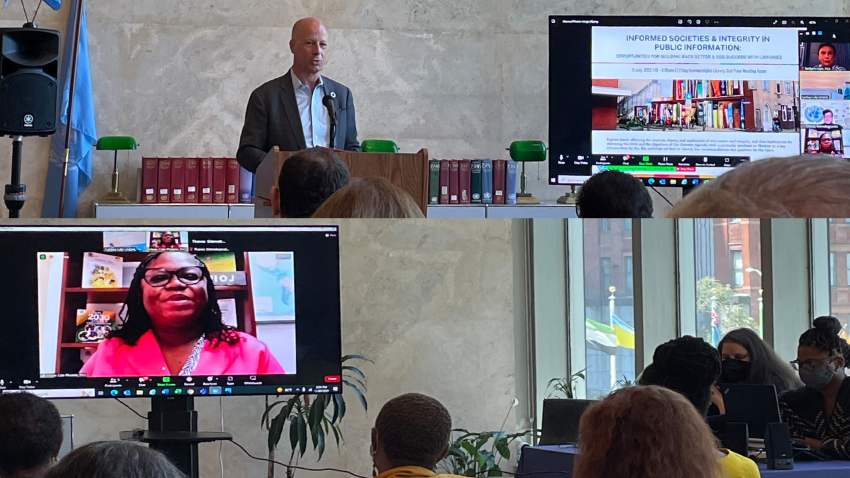The Dag Hammarskjöld Library partnered with the International Federation of Library Associations and Institution (IFLA), in hosting an event that took place on 11 July in the iconic 2nd floor Reading Room at UNHQ in New York. This was UN Library’s first in-person event since the beginning of the pandemic. We welcomed participants from 5 continents and across a broad spectrum of different kinds of libraries and institutions. The event focused on exploring trends that are affecting the creation, sharing and application of information for librarians around the world, and evaluate their implications for delivering the SDGs and the objectives of Our Common Agenda.
Maher Nasser, the Director of the Outreach Division of the Department of Global Communications opened the event by highlighting the role of libraries in the fight against misinformation and as partners in the recent Verified initiative. He also spoke of the need to work on changing individual actions using behavioral science as a guide, indicating the COVID “Pledge to Pause” campaign was focused on helping people evaluate the information they were sharing and breaking habits of sharing without finding the integrity of the content.
Barbara Lison, the President of IFLA, speaking from Germany aligned the event within the Secretary-General’s “Our Common Agenda” and urged participants to find concrete ideas and recommendations for promoting integrity in public information: “We need to do more, think more coherently, more ambitiously about how we can give everyone a chance to be active, discerning information-enabled members of community and society.”
With a particular emphasis on libraries as key infrastructure, librarians from Germany, Argentina, Botswana, Lesotho, USA, Jamaica, Latvia and Sri Lanka provided recommendations and insights for future development and deliberation. Common themes included the need for bottom-up solutions and looking at demand driven innovation focused on people-to-people connection as well as opening up the financial, policy and government gates that limit access. There is a need for open access and open science policies to facilitate an individuals’ right to information. An outcome document will be produced with recommendations to feed into the SDG process and the code of conduct for integrity in the promotion of public information.




